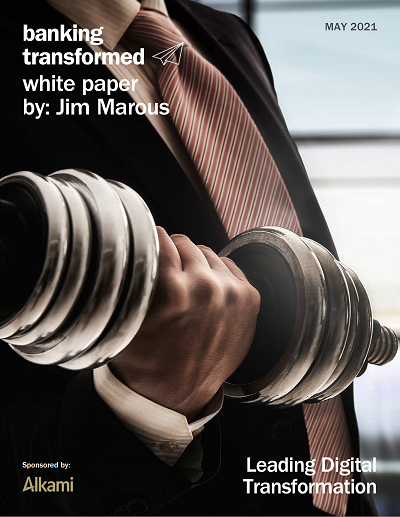Leading Digital Transformation
White Paper
Jim Marous
May 2021
: DBR 279
29 pages, 5 tables/charts
Download Printable Version of this page
Digital banking transformation is the most important overarching initiative in financial services today. Broad in scope and never-ending in execution, the process of making an organization future-ready for digital is a necessity for success.
Financial institution leaders worldwide understand that their customers, workers and competition have gone digital. In research done by the Digital Banking Report since the pandemic, organizations rank leadership vision, a customer-centric perspective and being digitally-savvy as essential to serving both external and internal constituencies. According to the MIT Sloan Management Review, “The idea that effective digital transformation delivers agility, adaptability, and customer centricity is now both a managerial mantra and leadership inspiration.”
Effective digital banking transformation leaders must have the ability to embrace change, take risks and disrupt both the organization and themselves. It requires retaining the skills that were used to move the organization forward in the past, as well as new skills that support a digital-ready future.
Leaders, who in the past placed a primary emphasis on greater efficiency and productivity, will need to expand their scope of influence and awareness to include an awareness of the digital behaviors of the consumer and business marketplace. They will also need to focus on developing a digitally savvy workforce that also values sustainability and social values.
Challenging financial institutions more than ever, workers believe their organizations fall short on many values-related issues, at the same time that an overwhelming majority strongly agree that it is very important to work for an organization with a purpose they believe in. In other words, workers believe that senior leaders lack credibility when it comes to aligning their organizations around a shared vision. This lack of credibility puts organizations’ long-term competitiveness at risk.
An added challenge is the blurring of boundaries between home and work, especially in a pandemic-impacted world where most, if not all, employees had to adjust to a remote work environment. And what will the future of work actually look like?
This research, sponsored by Alkami, provides a perspective on the heightened impact of leadership on the digital transformation of financial institutions. It discusses the needs of today’s workforces and the application of digital technology across organizations. It also illustrates the importance of having a ‘digital culture’.
It is clear that bank and credit union leaders can no longer ignore the impact of digital transformation on decisions around investment priorities, employee retraining, and culture shift. This report offers a perspective on the importance of leadership transformation as well as recommendations for setting the necessary foundation for leading digitally transformed organizations.
We hope these insights provide the basis for significant shifts in business priorities, strategies and tactics across the industry in 2021, helping your organization proceed aggressively in the pursuit of improved decision making and customer experiences.
Leading Digital Transformation
Advanced Analytics, AI, Analytics, Artificial Intelligence, Bank, Banking, Big Data, Credit Union, CRM, Customer Experience, Digital Banking, Digital Lending, Digital Marketing, Digital Transformation, Engagement, Fintech, Innovation, Marketing, Mobile Banking, Payments, Personalization, Technology, Trends

